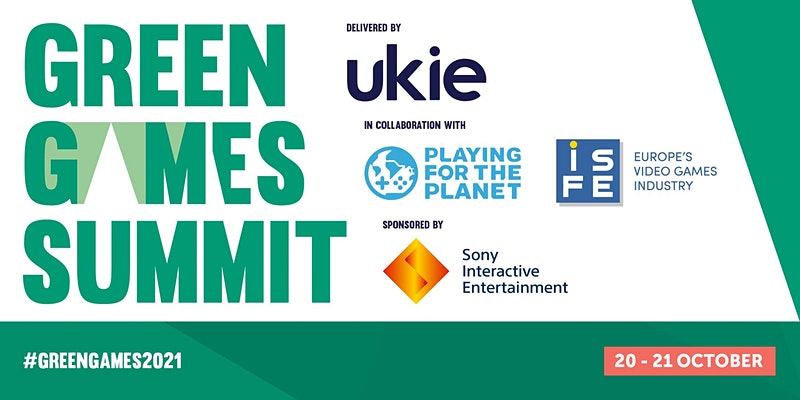The first ever Green Games Summit has concluded. Over 20 speakers from the worlds of games and climate science took to the virtual stage in front of hundreds of global leaders from the sector to discuss ways the industry can respond to the climate crisis.
But what were the main lessons from the summit? Here are four key things we learned from the Global Green Summit.
1. Start now, worry about perfection later.
A recurrent theme throughout the Summit was the idea that when it comes to climate action, we need to prioritize speed over perfectionism.
In an insightful introduction to the UN’s Playing for the Planet (P4P) Alliance, Sam Barratt, UN Environment’s Chief Education Officer, that the time for action is yesterday. "This next decade is going to determine if we live in a safe planet or an unsafe planet,” he explained, going on to point out that if we wait too long for the perfect solution, we’ll lose time we don’t have.
Dr Elizabeth Bagley, Program Director at Strategic Energy Innovations gave the example of Project Drawdown’s Improved Clean Cookstoves initiative: a solution replacing the solid fuel stoves depended on by 2.7 billon people globally with quite simple solar-powered or green fuel-burning stoves. “We have all the solutions in hand today to stop and reverse what we’ve done,” she explained; “what we need is for more people to put them into place.”
Meanwhile Deborah Mensah-Bonsu, founder of DMB Crew and Games for Good, reiterated the importance of starting now over starting perfect, explaining that every business can do something to fight climate change, no matter how small. “Start somewhere and make it better the next year,” she urged. “Don’t let great be the enemy of good.”

Sam Barratt, UN Environment’s Chief Education Officer introducing the ethos behind the UN's Playing for the Planet (P4P) Alliance
2. It’s more achievable than ever to get your studio to true net zero – but it can be tough.
“Net zero” means achieving a balance between the carbon emitted into the atmosphere and the carbon removed from it. Nic Walker, Head of Technical Operations at Space Ape Games gave an overview of this process, breaking it down into three key steps: “Measure, reduce, offset.”
The first step is to measure the total greenhouse gas (GHG) emissions of your business. Josh Aslan, Energy Policy Analyst, at Sony Interactive Entertainment directed attendees to the GHG Protocol, an organisation setting the standards by which emissions are measured and managed.
Once this data has been generated, the next step is to reduce, and the Science Based Targets initiative (SBTi) was raised as a great resource, providing a clearly-defined pathway for companies to reduce their GHG emissions.
Finally, any GHG emissions that absolutely cannot be reduced must be offset. This involves investing money into an initiative that either actively reduces GHG emissions or increases carbon storage, such as through the planting of trees.
Simple, right? Not really - this process can be fraught. There are several barriers to accessing all of your company’s GHG emissions, in particular the fuel mix on the energy grid that consumers use to play games. Dr Tristina Patterson pointed out that this is an area where public policy can lend a hand: “This information is needed. It’s important to gamers and it’s important to us to reduce our emissions and it should be open and available to all.”
3. Games are more than just games.
The Summit saw much enthusiasm for the potential of games to inspire and transform. Speakers made clear that delivering messages of sustainability, conservation and climate action to a game-playing audience of billions has massive implications for life outside of the small screen.
Jamie Alexander, Director at Project Drawdown introduced the organisation's climate solution ‘accelerators’; frameworks which speed up and scale climate action in practice. Notably, two of these accelerators focus specifically on cultural and behavioural shifts – and both speakers in this session were optimistic about the role of games in delivering these shifts.
Similarly, Adrian Dellecker of the Luc Hoffmann Institute pointed out how games can address two key issues in the world of conservation; lack of engagement and lack of funding. By creating worlds in which players feel they are making an active (if fictional) difference, games can encourage people to feel part of the conservation issue. And as one of the world’s largest entertainment industries, games promise could help bridge the funding gap through the right considered partnerships.
We were also treated to a glimpse of exactly the kinds of games that might contain this kind of potential. Eyram Twaia of Leti Arts explained how the Kenya-based studio is breaking new ground in Africa by combining the culturally disparate spheres of education and games. Giorgia La Rocca introduced Ubisoft’s Hungry Shark expansion pack developed in collaboration with Oceana for the P4P Alliance’s 2020 Green Game Jam. And indeed, in the case of Ustwo Games’ Alba: A Wildlife Adventure, Jane Campbell explained how the studio literally extended the game’s themes of climate action into real-world conservation efforts, with every copy or download of the game sold corresponding to one tree planted.
.png)
Jamie Alexander, Director at Project Drawdown presenting the organisation's climate solution ‘accelerators’ to scale and speed up climate action.
4. The games industry can set an example to the rest of the tech and entertainment sectors.
Whilst the games industry might not be the highest global contributor to GHG emissions, the innovative spirit that characterises the industry can set the tone for others – and our talent and technology can be borrowed to develop cleaner, sustainable futures.
Ukie’s own Special Projects Lead Dan Wood discussed the emerging field of green coding. “It’s an emerging area but we think the games industry can really lead the way in this space," he explained.
This particular talk saw insights from Rebecca Reed, Director of Electrical Engineering at Xbox about the tightrope walk between allowing developers all the potential of a high-performing console whilst keeping power usage down.
Meanwhile Oscar Michael Esio, Founder of Africacomicade explained the importance of engaging African developers with green coding practices. The continent’s status as an emerging market, he explained, means it needs to be guided away from making the same mistakes as established ones.
Nicolas Hunsinger, the Director of Corporate Environmental Sustainability at Ubisoft, and Armelle Andre, a Data Science Manager in the Brand Portfolio Management Team, delivered a case study exemplifying how the games industry is introducing cultures of change. Within Ubisoft, employee “green committees” collaborate with the CSR team to contribute to the company’s sustainability goals – from reducing waste in the office cafeteria to hosting educational events.
Meanwhile, Kristian Segerstrale, CEO of Super Evil Megacorp raised the possibility of fundraising, citing the 18 games founders who made large donations towards his climate action pledge in collaboration with the co-founders of Supercell, Amplifier/Unity and Kebam. "I'm excited about the games industry's contribution not only in cleaning itself up,” he explained, “but in non-profit and in helping to develop clean tech."
Indeed, Katie Patrick, Environmental Engineer echoed this enthusiasm for the overlap between games technology and climate action. Her concept of a “climate fitbit” engages the technology of game designers and behavioural scientists – live data indicating a personal carbon footprint. "Nothing works as well as saying you're doing 30% worse than somebody else,” she quipped.
The UN's Playing for the Planet initiative will be representing the games industry at COP 26 in Glasgow in November. Support their work by considering joining the programme here.

